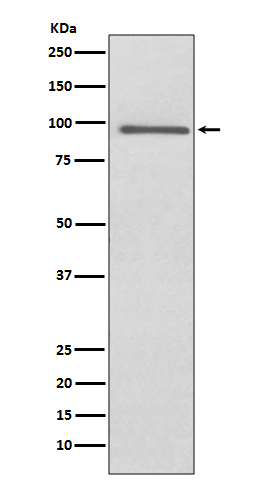
| WB | 1/500-1/1000 | Human,Mouse,Rat |
| IF | 咨询技术 | Human,Mouse,Rat |
| IHC | 咨询技术 | Human,Mouse,Rat |
| ICC | 技术咨询 | Human,Mouse,Rat |
| FCM | 咨询技术 | Human,Mouse,Rat |
| Elisa | 咨询技术 | Human,Mouse,Rat |
| Aliases | Homeobox prospero like protein; Prospero homeobox protein 1; prospero-related homeobox gene 1; PROX1 |
| Entrez GeneID | 5629 |
| WB Predicted band size | Calculated MW: 83 kDa; Observed MW: 95 kDa |
| Host/Isotype | Rabbit IgG |
| Antibody Type | Primary antibody |
| Storage | Store at 4°C short term. Aliquot and store at -20°C long term. Avoid freeze/thaw cycles. |
| Species Reactivity | Human |
| Immunogen | A synthesized peptide derived from human PROX1 |
| Formulation | Purified antibody in PBS with 0.05% sodium azide. |
+ +
以下是3篇关于PROX1抗体的参考文献及其摘要概括:
1. **文献名称**:*PROX1 promotes lineage-specific expression of fibroblast growth factor receptor-3 in lymphatic endothelium*
**作者**:Shin et al.
**摘要**:研究利用PROX1抗体进行免疫染色,揭示PROX1转录因子在淋巴管内皮细胞分化中的作用,并调控FGFR3的表达。
2. **文献名称**:*PROX1 is a marker of functional hepatic stellate cells and promotes liver fibrosis*
**作者**:Yang et al.
**摘要**:通过PROX1抗体免疫组化及流式分析,发现PROX1在肝星状细胞中高表达,并促进肝纤维化进程。
3. **文献名称**:*The role of PROX1 in colorectal cancer progression*
**作者**:Petrova et al.
**摘要**:使用PROX1抗体检测结直肠癌组织,发现PROX1表达缺失与肿瘤侵袭性增强及患者预后不良相关。
The PROX1 antibody targets the Prospero homeobox 1 (PROX1) protein, a key transcription factor critical for embryonic development and cellular differentiation. Initially identified in Drosophila, PROX1 regulates cell fate decisions, particularly in lymphatic endothelial cells, hepatocytes, and neurons. It plays a pivotal role in lymphangiogenesis by activating genes like VEGFR-3 and guides neurogenesis by maintaining progenitor cell identity. In adults, PROX1 is involved in tissue homeostasis, metabolism, and cancer suppression, with reduced expression linked to tumors such as hepatocellular carcinoma and glioblastoma.
PROX1 antibodies are widely used in research to study developmental biology, cancer mechanisms, and metabolic disorders. They enable detection of PROX1 via techniques like immunohistochemistry, Western blotting, and flow cytometry, aiding in mapping its tissue-specific expression and interactions with signaling pathways (e.g., Wnt/β-catenin). Additionally, these antibodies help explore PROX1's dual role as a tumor suppressor or promoter in context-dependent malignancies. Their diagnostic potential is emerging, particularly in assessing lymphatic invasion in cancers. Validation for specificity and cross-reactivity remains essential to ensure reliability in experimental and clinical applications.
×